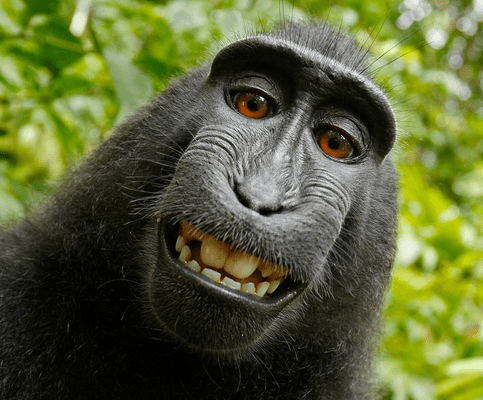A major debate is taking place as to whether or not an animal can own the copyright to a selfie that the animal itself took.
The curious animal in question is Naturo, a crested black macaque monkey from Indonesia that took an unforgettable selfie while playing with photographer David J. Slater’s unattended camera. The picture became known as “Monkey Selfie”.
However, PETA is filing a federal lawsuit on behalf of Naturo, stating that the monkey should be awarded the copyright for the photograph and not Slater. PETA claims that Naturo is the author of the selfie and thus should be granted the rights.
While the pictures were taken in Indonesia, a United States federal court in California has jurisdiction since the publisher of Slater’s book is from that state. Slater’s book is titled Wildlife Personalities.
In the lawsuit, PETA says, “While the claim of authorship by species other than Homo sapiens may be novel, ‘authorship; under the Copyright Act, 17 U.S.C. § 101 et seq., is sufficiently broad so as to permit the protections of the law to extend to any original work, including those created by Naruto.”
Slater is not happy with the lawsuit. He wrote on Facebook, “I am obviously bemused at PETA’s stunt but also angry as well as sad. This makes animal welfare charities look bad which saddens me, deflecting away from the animals and onto stunts like this.”
Slater added that he has worked with PETA in the past.
So who owns the photo – Naturo or Slater? Some people argue that nobody does.
Wikimedia, host of the popular website Wikipedia, has permitted the photo on its website. Slater has demanded Wikimedia to remove the photo, but the website is refusing to do so, stating that the photo cannot be copyrighted due to the fact that animals are not permitted to own copyrights.
Therefore, the photo would be in the public domain, free for anyone to use.
Meanwhile, Slater cannot make money off of the photo used in free domain.
There are three requirements for a work to receive copyright protection. The work must be fixed in a tangible medium, it must be original, and it must have an author.
In this case, the work definitely is a tangible medium, and it is certainly original.
However, the author requirement may be a problem for PETA and Naturo. Authorship implies that the work in question was created by a human being. Materials that are created by nature, plants, or animals cannot be copyrighted.
That being said, it does not appear that Slater can claim the photo either. Animals cannot create a copyrightable work. Therefore, the photo can never receive copyright protection.
As such, the photograph should fall into the public domain and be free to use by anyone.
Stay Connected